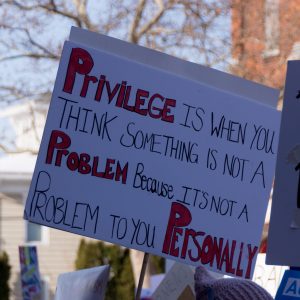 TORONTO — An Orthodox girls school in a small Israeli town put up a wall to divide its students some two years ago. Yifat Bitton spent the next two years working to tear it down.
TORONTO — An Orthodox girls school in a small Israeli town put up a wall to divide its students some two years ago. Yifat Bitton spent the next two years working to tear it down.
Yifat Bitton
Bitton, who spoke Feb. 4 at Adath Israel Congregation as the guest of the New Israel Fund of Canada, is a lawyer and co-chair of the Tmura Center, an Israeli civil rights group.
Last summer, the centre gained a legal victory against the Beit Yaakov school in Immanuel, Israel, which segregated Ashkenazi and Sephardi students, built a wall to divide the two groups and used a separate educational curriculum.
Bitton was involved in taking the case to Israel’s Supreme Court, which ruled in her favour and ordered the abolition of any segregation. But this legal victory may not translate into a tangible one, she said.
“This is too early to celebrate. This [decision] is irrelevant to the [students]. They go tomorrow to school the same way they went to school for two years,” she said, adding that the only change the school made was to dismantle the wall.
“Practically nothing substantial has happened… The classes miraculously were still structured in the same way. Ashkenazi on one side, Sephardi on the other.”
Bitton, an associate professor at the School of Management Law School in Israel, works to raise awareness about discrimination against Mizrahi (Sephardi) Jews in Israel. Mizrahi Jews are those who originated in the Middle East, Central Asia, North Africa and the Caucasus, which include Armenia, Azerbaijan and Georgia.
“This Immanuel case is representative of what’s going on in Israel,” she said.
Bitton said this can be seen in employment statistics. About 7.5 per cent of the Mizrahi population in Israel are unemployed, compared to the 1.5 per cent of Ashkenazi Jews who are unemployed. In Israeli universities, about nine per cent of the faculty are Mizrahi Jews, while 90 per cent are Ashkenazi Jews and one per cent of the faculty are Arabs.
This discrimination isn’t limited to social institutions, Bitton said, adding that it’s difficult for Mizrahi youth to get into night clubs in Israel.
“They’re simply not allowed into night clubs,” she said. “These are guys that won’t even categorize themselves as Mizrahi Jews. They’ll say, ‘We’re Israeli.’”
Bitton added that there is little awareness of any discrimination against Sephardi Jews in Israel.
“Jewish society thinks of itself as an egalitarian one. It’s a homeland for all Jews,” she said.
“When you’re not told that something is a result of discrimination… you’d rather not see it as discrimination,” she said. “You have to know what the disease is in order to treat it.”






